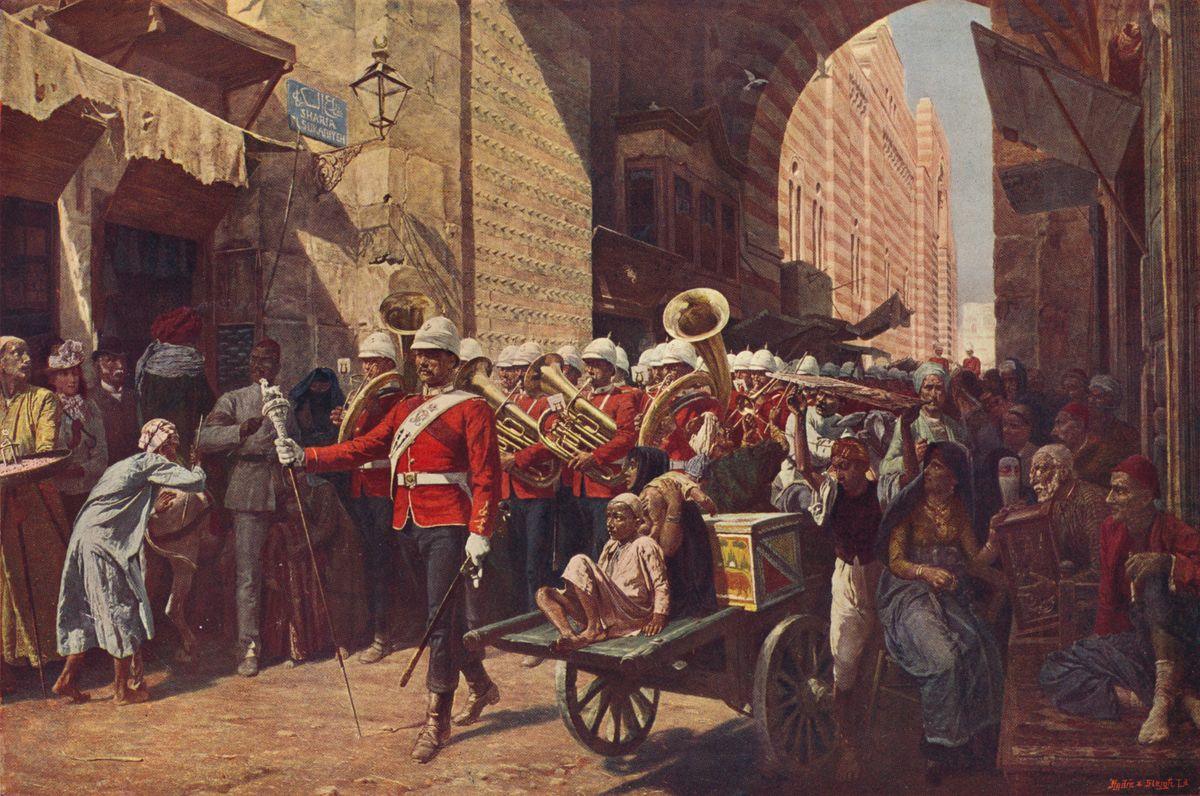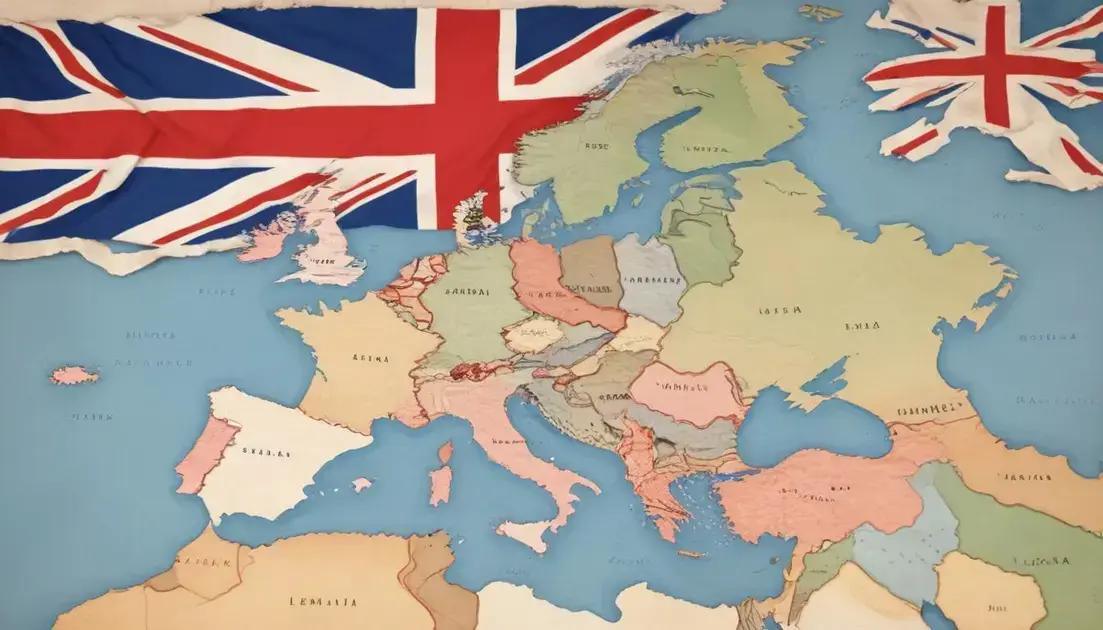
The Rise of the British Empire and Its Global Impact
The British Empire, a colossal entity spanning centuries and continents, remains one of history’s most impactful and controversial subjects. At its zenith, this sprawling dominion controlled approximately 23% of the world’s landmass and exerted profound influence over a quarter of its population. Its legacy is etched across the globe, visible in political structures, economic systems, cultural norms, and even the languages spoken today. This exploration delves into the intricate tapestry of the British Empire’s rise, its global impact, its eventual decline, and the enduring consequences of its existence.
I. The Seeds of Empire: Early Expansion (15th-17th Centuries)
The foundations of the British Empire were laid not through a single decisive conquest, but rather through a gradual process of exploration, trade, and colonization that spanned centuries. The era’s nascent capitalism, fueled by a burgeoning merchant class and a thirst for new markets and resources, proved a powerful catalyst. While England wasn’t the first European power to engage in overseas expansion – Portugal and Spain had established significant empires earlier – England’s strategic location, its growing naval power, and its increasingly sophisticated financial system positioned it for eventual dominance.
The Tudor dynasty played a pivotal role. Queen Elizabeth I’s reign (1558-1603) witnessed significant expansion, marked by the burgeoning power of the private sector. The formation of the British East India Company in 1600 represents a turning point. This joint-stock company, initially focused on establishing trade routes to the East Indies (present-day India, Indonesia, and beyond), gradually evolved into a quasi-governmental entity, wielding significant political and military power in its own right. Its activities in India, initially centered on trade in spices and textiles, laid the groundwork for Britain’s eventual control over the Indian subcontinent.
Simultaneously, England began establishing footholds in the Americas. The ill-fated Roanoke Colony (1585-1590) might have failed, but the establishment of Jamestown, Virginia, in 1607 marked a more enduring success. These early colonies, though initially struggling, demonstrated England’s growing ambition to establish permanent settlements beyond its European shores. This expansion was driven by various motivations: the pursuit of gold and other precious metals, the desire for new agricultural lands, and the ambition to establish religious freedom (as seen in the Puritan migrations to New England).
The 17th century witnessed the increasing consolidation of England’s imperial ambitions. The Navigation Acts, a series of laws enacted between 1651 and 1673, aimed to restrict colonial trade to British ships and ports, thereby bolstering the British economy and consolidating its control over the colonies. This restrictive approach, while economically beneficial for England, also fostered resentment among the colonists and laid the groundwork for future conflicts. The growing rivalry with other European powers, notably France and Spain, further fueled the need for increased naval strength and overseas expansion.
II. The Age of Mercantilism and Global Dominance (18th-19th Centuries)
The 18th and 19th centuries marked the apex of British imperial expansion. The era of mercantilism, with its emphasis on maximizing national wealth through trade surpluses and colonial exploitation, profoundly shaped imperial policy. The British Empire transitioned from a collection of disparate trading posts and colonies into a highly structured, globally interconnected network.
The Seven Years’ War (1756-1763), a global conflict involving major European powers, proved pivotal. Britain’s victory significantly expanded its territorial holdings, including Canada and significant portions of India. Robert Clive’s military triumphs in India, particularly the Battle of Plassey in 1757, effectively established British hegemony over much of the subcontinent. The East India Company’s power grew exponentially, transforming from a trading company into a de facto ruling authority, administering vast territories and millions of people. This period also witnessed the expansion of British influence in the Caribbean, acquiring sugar-producing islands that fuelled Britain’s burgeoning economy.
The late 18th and 19th centuries saw a dramatic acceleration of British expansion. The industrial revolution, originating in Britain, provided the empire with a significant technological and economic advantage. Mass production enabled the export of manufactured goods to colonies worldwide, fueling economic growth at home while simultaneously creating new markets for British goods. The colonies served as sources of raw materials – cotton, rubber, timber, and minerals – essential for the industrial engine, creating a system of dependency and exploitation.
The acquisition of vast territories in Africa, known as the “Scramble for Africa,” during the late 19th century exemplifies the empire’s relentless expansion. This period was marked by aggressive colonization, driven by economic opportunism, strategic geopolitical positioning, and a fervent belief in British racial superiority. Simultaneously, British expansion continued in Asia, including the annexation of Burma (Myanmar) and the expansion of influence in China. The establishment of colonies in Australia and New Zealand added to the empire’s growing global reach. The construction of the Suez Canal in 1869, though not directly a British undertaking, significantly enhanced the strategic importance of the empire, connecting Britain to its far-flung possessions in Asia and Africa.
III. The Industrial Revolution’s Impact and Economic Exploitation
The Industrial Revolution, originating in Great Britain, was inextricably linked to the empire’s growth and expansion. The revolution’s technological innovations—steam engines, power looms, and improved manufacturing techniques—increased production efficiency and reduced the cost of manufactured goods. This enabled Britain to flood global markets with competitively priced products, consolidating its economic dominance.
However, this economic prosperity came at a significant cost. The empire’s system operated on principles of exploitation, extracting vast amounts of wealth from its colonies. Raw materials were shipped to Britain for processing and manufacturing, with finished goods then sold back to the colonies at inflated prices. This unequal exchange system enriched Britain while perpetuating economic dependence and poverty within the colonies.
The imperial system fostered a complex web of economic relationships. The colonies served as crucial sources of raw materials, markets for manufactured goods, and sites for investment of capital. The system was highly structured, with established trade routes, shipping lines, and financial institutions facilitating the flow of goods and capital across the empire. This economic interconnectedness, while beneficial for Britain, was often detrimental to the colonized populations, limiting their economic development and perpetuating a cycle of dependency.
The East India Company’s role in India serves as a compelling example. While the company initially focused on trade, it gradually assumed control over vast areas of the subcontinent. Its monopolistic practices, coupled with the exploitation of resources and the imposition of unfair taxes, resulted in widespread poverty and hardship among the Indian population.
IV. The British Empire’s Global Impact: A Mixed Legacy
The British Empire’s influence extends far beyond its geographical boundaries. Its impact on global politics, economics, culture, and societal structures is profound and multifaceted. While often framed as a story of progress and enlightenment, a crucial aspect is the acknowledgment of the immense suffering and exploitation experienced by colonized peoples.
Political Impact: The British system of governance, based on parliamentary democracy and the rule of law (though often inconsistently applied within the empire), had a demonstrable impact on many colonized nations. While not always resulting in immediate democratization, the introduction of concepts like representative government and codified laws left a lasting mark on political systems in many former colonies. However, the imposition of this system often disregarded existing local governance structures, leading to instability and conflict in the post-colonial era. The Westminster system of government, prevalent in many former colonies, stands as a testament to the empire’s lasting political influence.
Economic Impact: The empire’s economic impact was undeniably transformative, but its effects were unevenly distributed. While Britain prospered immensely, many colonies were left economically underdeveloped, dependent on exporting raw materials and importing finished goods. This dependency frequently hampered the development of local industries and created long-term economic challenges for many former colonies. The legacy of unequal trade relationships and exploitation continues to affect many countries today.
Cultural Impact: The spread of the English language is arguably the most significant cultural legacy of the British Empire. English has become a global lingua franca, facilitating communication and trade across borders. However, this dominance often came at the expense of local languages and cultural traditions, leading to the erosion of linguistic and cultural diversity in many parts of the world. The imposition of British cultural norms and values also had a lasting impact, influencing everything from education systems to social customs.
Social Impact: The empire’s social impact was deeply complex and often destructive. Colonial rule often involved the suppression of indigenous cultures, the disruption of traditional social structures, and the imposition of discriminatory laws and practices. Racism and racial hierarchies were systemic within the empire, and their legacy continues to manifest in social inequalities in many former colonies. The legacy of colonialism includes lasting trauma and social injustice.
V. The Decline and Decolonization: A Gradual Unraveling
The decline of the British Empire was a gradual process that began in the aftermath of World War I. The war’s immense costs weakened Britain’s economic and military power, while simultaneously fueling nationalist sentiments within the colonies. The rise of competing global powers, such as the United States and the Soviet Union, further challenged Britain’s global dominance.
The interwar period witnessed growing demands for self-governance and independence within the colonies. The Indian independence movement, led by figures like Mahatma Gandhi and Jawaharlal Nehru, was particularly influential, culminating in India’s independence in 1947. This event marked a significant turning point, symbolizing the unraveling of the empire.
World War II proved catastrophic for the empire. While Britain emerged victorious, the war severely depleted its resources and further weakened its international standing. The costs of maintaining a vast empire became increasingly unsustainable. The post-war era saw a wave of decolonization across Africa, Asia, and the Caribbean, with many colonies gaining independence. The process of decolonization was often fraught with conflict and violence, as colonial powers struggled to relinquish control and nationalist movements fought for self-determination.
The granting of independence was rarely a smooth or benevolent process. Many former colonies faced significant challenges in establishing stable governments and economies after independence. The legacy of colonialism often created conditions of instability, conflict, and economic hardship. The arbitrary borders drawn during the colonial era frequently contributed to ethnic tensions and conflicts in the post-colonial period.
VI. The Enduring Legacy: A Complex and Contested Narrative
The British Empire’s legacy is a complex and contested narrative. While it left behind significant infrastructure, institutions, and cultural influences, it also inflicted immense suffering and exploitation upon countless individuals and communities. The effects of colonialism continue to resonate today, shaping political landscapes, economic structures, and societal norms in many parts of the world.
The empire’s story is not solely one of conquest and exploitation; it’s also a story of innovation, cultural exchange, and the development of legal and political systems that have influenced the world. However, acknowledging the immense suffering caused by the empire’s actions is crucial for a complete and honest understanding of its legacy. The narrative must encompass both the positive and negative aspects, allowing for a critical assessment of its impact on the world.
Understanding the British Empire requires a nuanced approach, acknowledging its complexities and its profound impact on the modern world. It’s a narrative of both triumph and tragedy, a story of progress and exploitation, a legacy that continues to shape the global landscape today. The study of this vast and complex empire is not simply a historical exercise; it’s essential for understanding the present and shaping a more just and equitable future. The ongoing debates surrounding reparations, historical memory, and the continuing impacts of colonialism demonstrate the enduring relevance of this historical period. Only through a thorough and critical engagement with this history can we hope to build a world free from the inequalities and injustices born from imperial pasts.


